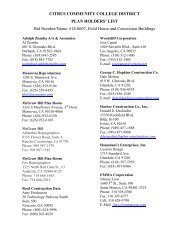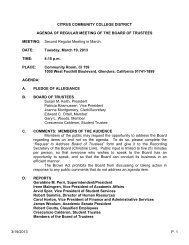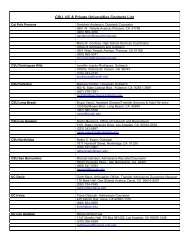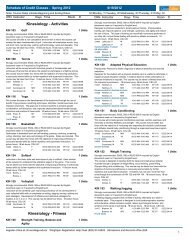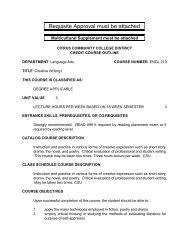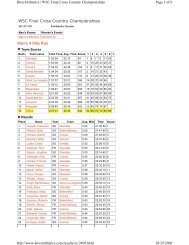Citrus College Catalog 2009-2010 (ver. 10/22
Citrus College Catalog 2009-2010 (ver. 10/22
Citrus College Catalog 2009-2010 (ver. 10/22
You also want an ePaper? Increase the reach of your titles
YUMPU automatically turns print PDFs into web optimized ePapers that Google loves.
ELEC 202<br />
Solid State Devices<br />
4 Units<br />
Prerequisite: ELEC <strong>10</strong>1.<br />
The study of semiconductor solid state<br />
and linear integrated circuit theory with<br />
the following devices: diodes, bipolar transistors,<br />
field effect transistors, operational<br />
amplifiers, times, optoelectronics, thyristors,<br />
with an introduction to lasers. In the<br />
laboratory the student will conduct experiments<br />
using electronic test equipment<br />
with discrete devices, including linear integrated<br />
circuits. 54 lecture hours, 54 lab<br />
hours.<br />
Cooperative Education Courses<br />
ELEC 698A<br />
Cooperative Education<br />
1 Unit Grade or P/NP<br />
Enrollment in a minimum of seven<br />
units of credit including Cooperative<br />
Education during the regular semester.<br />
During the summer the student must<br />
be enrolled in at least one other<br />
class.<br />
A course designed to assist students in<br />
planning and accomplishing meaningful<br />
learning objectives related to Electronics<br />
at their place of volunteer employment or<br />
training sites. This course may be taken<br />
four times. 60 lab hours arranged per semester.<br />
ELEC 698B<br />
Cooperative Education<br />
2 Units Grade or P/NP<br />
Enrollment in a minimum of seven<br />
units of credit including Cooperative<br />
Education during the regular semester.<br />
During the summer the student must<br />
be enrolled in at least one other<br />
class.<br />
A course designed to assist students in<br />
planning and accomplishing meaningful<br />
learning objectives related to Electronics<br />
at their place of volunteer employment or<br />
training sites. This course may be taken<br />
four times. 120 lab hours arranged per semester.<br />
ELEC 698C<br />
Cooperative Education<br />
3 Units Grade or P/NP<br />
Enrollment in a minimum of seven<br />
units of credit including Cooperative<br />
Education during the regular semester.<br />
During the summer the student must<br />
be enrolled in at least one other<br />
class.<br />
A course designed to assist students in<br />
planning and accomplishing meaningful<br />
learning objectives related to Electronics<br />
at their place of volunteer employment or<br />
training sites. This course may be taken<br />
four times. 180 lab hours arranged per semester.<br />
ELEC 698D<br />
Cooperative Education<br />
4 Units Grade or P/NP<br />
Enrollment in a minimum of seven<br />
units of credit including Cooperative<br />
Education during the regular semester.<br />
During the summer the student must<br />
be enrolled in at least one other<br />
class.<br />
A course designed to assist students in<br />
planning and accomplishing meaningful<br />
learning objectives related to Electronics<br />
at their place of volunteer employment or<br />
training sites. This course may be taken<br />
four times. 240 lab hours arranged per semester.<br />
ELEC 699A<br />
Cooperative Education<br />
1 Unit Grade or P/NP<br />
Enrollment in a minimum of seven<br />
units of credit including Cooperative<br />
Education during the regular semester.<br />
During the summer the student must<br />
be enrolled in at least one other<br />
class.<br />
A course designed to assist students in<br />
planning and accomplishing meaningful<br />
learning objectives related to Electronics<br />
at their place of paid employment or training<br />
sites. This course may be taken four<br />
times. 75 lab hours arranged per semester.<br />
ELEC 699B<br />
Cooperative Education<br />
2 Units Grade or P/NP<br />
Enrollment in a minimum of seven<br />
units of credit including Cooperative<br />
Education during the regular semester.<br />
During the summer the student must<br />
be enrolled in at least one other<br />
class.<br />
A course designed to assist students in<br />
planning and accomplishing meaningful<br />
learning objectives related to Electronics<br />
at their place of paid employment or training<br />
sites. This course may be taken four<br />
times. 150 lab hours arranged per semester.<br />
ELEC 699C<br />
Cooperative Education<br />
3 Units Grade or P/NP<br />
Enrollment in a minimum of seven<br />
units of credit including Cooperative<br />
Education during the regular semester.<br />
During the summer the student must<br />
be enrolled in at least one other<br />
class.<br />
A course designed to assist students in<br />
planning and accomplishing meaningful<br />
learning objectives related to Electronics<br />
at their place of paid employment or training<br />
sites. This course may be taken four<br />
times. <strong>22</strong>5 lab hours arranged per semester.<br />
ELEC 699D<br />
Cooperative Education<br />
4 Units Grade or P/NP<br />
Enrollment in a minimum of seven<br />
units of credit including Cooperative<br />
Education during the regular semester.<br />
During the summer the student must<br />
be enrolled in at least one other<br />
class.<br />
A course designed to assist students in<br />
planning and accomplishing meaningful<br />
learning objectives related to Electronics<br />
at their place of paid employment or training<br />
sites. This course may be taken four<br />
times. 300 lab hours arranged per semester.<br />
Emergency Management<br />
(Health Sciences Department)<br />
Emergency Management Courses<br />
EMER 162<br />
Principles of Emergency Management<br />
3 Units<br />
Strongly recommended: READ 099 if<br />
required by reading placement exam<br />
or if required by reading level.<br />
This course provides an introduction to<br />
the principles of Emergency Management<br />
and Disaster Planning. Topics co<strong>ver</strong>ed include:<br />
terrorist profiles, trends in terrorism,<br />
the emergency operations plan,<br />
response consideration to chemical and biological<br />
incidents and components of the<br />
emergency management system. 54 lecture<br />
hours.<br />
EMER 163<br />
Terrorism and Emergency<br />
Management<br />
3 Units<br />
Strongly Recommended: READ 099 if<br />
required by reading placement exam<br />
or if required by reading level.<br />
This course provides instruction to terrorism<br />
and the emergency management of<br />
terrorist types of acts. Topics co<strong>ver</strong>ed include;<br />
concepts of emergency management,<br />
event management, local plans and<br />
resources, general biological terrorism<br />
concepts, medical consequences and planning<br />
guidelines. This course will present a<br />
foundation of the threat and explore mitigation<br />
techniques. 54 lecture hours.<br />
EMER 164<br />
Managing Hazardous Materials<br />
Incidents<br />
3 Units<br />
Strongly recommended: READ 099 if<br />
required by reading placement exam<br />
or if required by reading level.<br />
This course provides an introduction to<br />
hazardous materials and management.<br />
Topics co<strong>ver</strong>ed include; recognizing what<br />
CITRUS COLLEGE CATALOG <strong>2009</strong> • <strong>20<strong>10</strong></strong> www.citruscollege.edu 149






